Evaluating Hospitality Paradigms: Gastronomy Essay
VerifiedAdded on 2023/01/16
|17
|5149
|51
Essay
AI Summary
This essay examines the significance of gastronomy within the hospitality industry, particularly in the context of the experience economy and the competitive landscape of tourism. It explores how food and beverage experiences contribute to guest satisfaction, revenue growth, and the evolution of gastronomic and culinary tourism. The essay evaluates alternative hospitality paradigms, including the impact of creative approaches, and discusses practical implications for the future development of the sector. It highlights the importance of culinary creativity, market acceptance, and the influence of globalization on gastronomic preferences. The essay also touches upon examples of successful innovation in the industry, such as molecular cuisine and fast-food adaptations, and considers the role of theoretical and practical gastronomy in shaping hospitality practices.
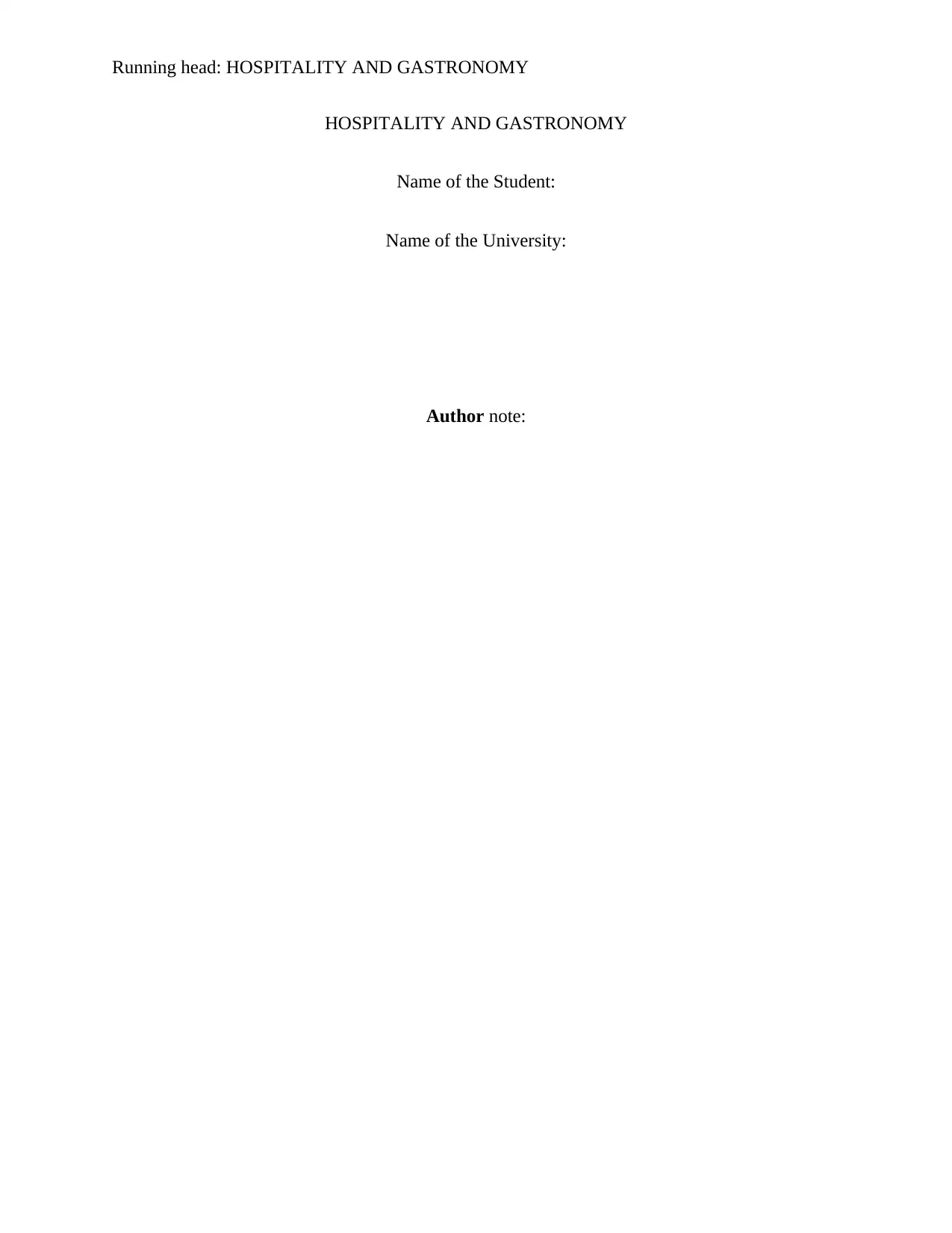
Running head: HOSPITALITY AND GASTRONOMY
HOSPITALITY AND GASTRONOMY
Name of the Student:
Name of the University:
Author note:
HOSPITALITY AND GASTRONOMY
Name of the Student:
Name of the University:
Author note:
Paraphrase This Document
Need a fresh take? Get an instant paraphrase of this document with our AI Paraphraser
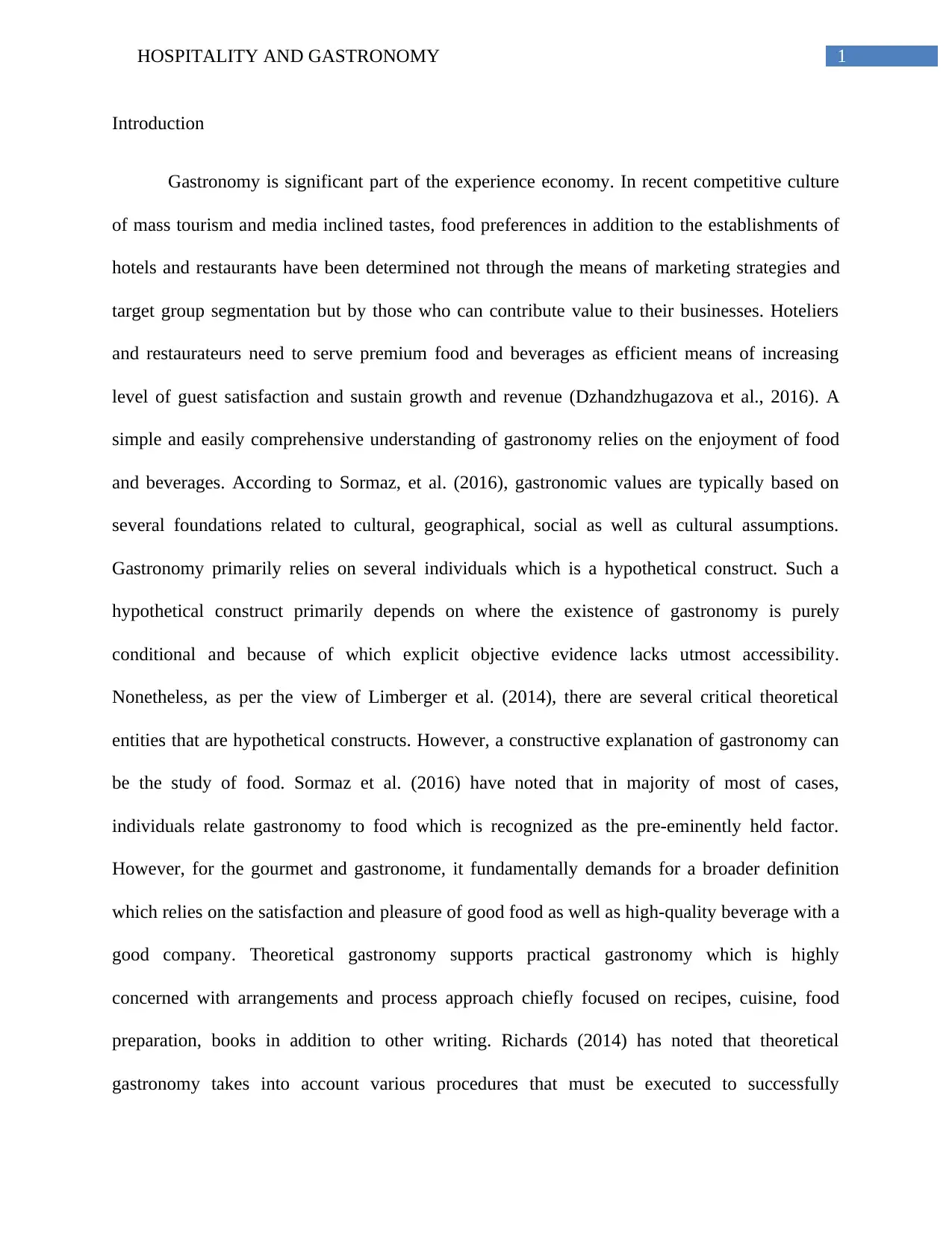
1HOSPITALITY AND GASTRONOMY
Introduction
Gastronomy is significant part of the experience economy. In recent competitive culture
of mass tourism and media inclined tastes, food preferences in addition to the establishments of
hotels and restaurants have been determined not through the means of marketing strategies and
target group segmentation but by those who can contribute value to their businesses. Hoteliers
and restaurateurs need to serve premium food and beverages as efficient means of increasing
level of guest satisfaction and sustain growth and revenue (Dzhandzhugazova et al., 2016). A
simple and easily comprehensive understanding of gastronomy relies on the enjoyment of food
and beverages. According to Sormaz, et al. (2016), gastronomic values are typically based on
several foundations related to cultural, geographical, social as well as cultural assumptions.
Gastronomy primarily relies on several individuals which is a hypothetical construct. Such a
hypothetical construct primarily depends on where the existence of gastronomy is purely
conditional and because of which explicit objective evidence lacks utmost accessibility.
Nonetheless, as per the view of Limberger et al. (2014), there are several critical theoretical
entities that are hypothetical constructs. However, a constructive explanation of gastronomy can
be the study of food. Sormaz et al. (2016) have noted that in majority of most of cases,
individuals relate gastronomy to food which is recognized as the pre-eminently held factor.
However, for the gourmet and gastronome, it fundamentally demands for a broader definition
which relies on the satisfaction and pleasure of good food as well as high-quality beverage with a
good company. Theoretical gastronomy supports practical gastronomy which is highly
concerned with arrangements and process approach chiefly focused on recipes, cuisine, food
preparation, books in addition to other writing. Richards (2014) has noted that theoretical
gastronomy takes into account various procedures that must be executed to successfully
Introduction
Gastronomy is significant part of the experience economy. In recent competitive culture
of mass tourism and media inclined tastes, food preferences in addition to the establishments of
hotels and restaurants have been determined not through the means of marketing strategies and
target group segmentation but by those who can contribute value to their businesses. Hoteliers
and restaurateurs need to serve premium food and beverages as efficient means of increasing
level of guest satisfaction and sustain growth and revenue (Dzhandzhugazova et al., 2016). A
simple and easily comprehensive understanding of gastronomy relies on the enjoyment of food
and beverages. According to Sormaz, et al. (2016), gastronomic values are typically based on
several foundations related to cultural, geographical, social as well as cultural assumptions.
Gastronomy primarily relies on several individuals which is a hypothetical construct. Such a
hypothetical construct primarily depends on where the existence of gastronomy is purely
conditional and because of which explicit objective evidence lacks utmost accessibility.
Nonetheless, as per the view of Limberger et al. (2014), there are several critical theoretical
entities that are hypothetical constructs. However, a constructive explanation of gastronomy can
be the study of food. Sormaz et al. (2016) have noted that in majority of most of cases,
individuals relate gastronomy to food which is recognized as the pre-eminently held factor.
However, for the gourmet and gastronome, it fundamentally demands for a broader definition
which relies on the satisfaction and pleasure of good food as well as high-quality beverage with a
good company. Theoretical gastronomy supports practical gastronomy which is highly
concerned with arrangements and process approach chiefly focused on recipes, cuisine, food
preparation, books in addition to other writing. Richards (2014) has noted that theoretical
gastronomy takes into account various procedures that must be executed to successfully
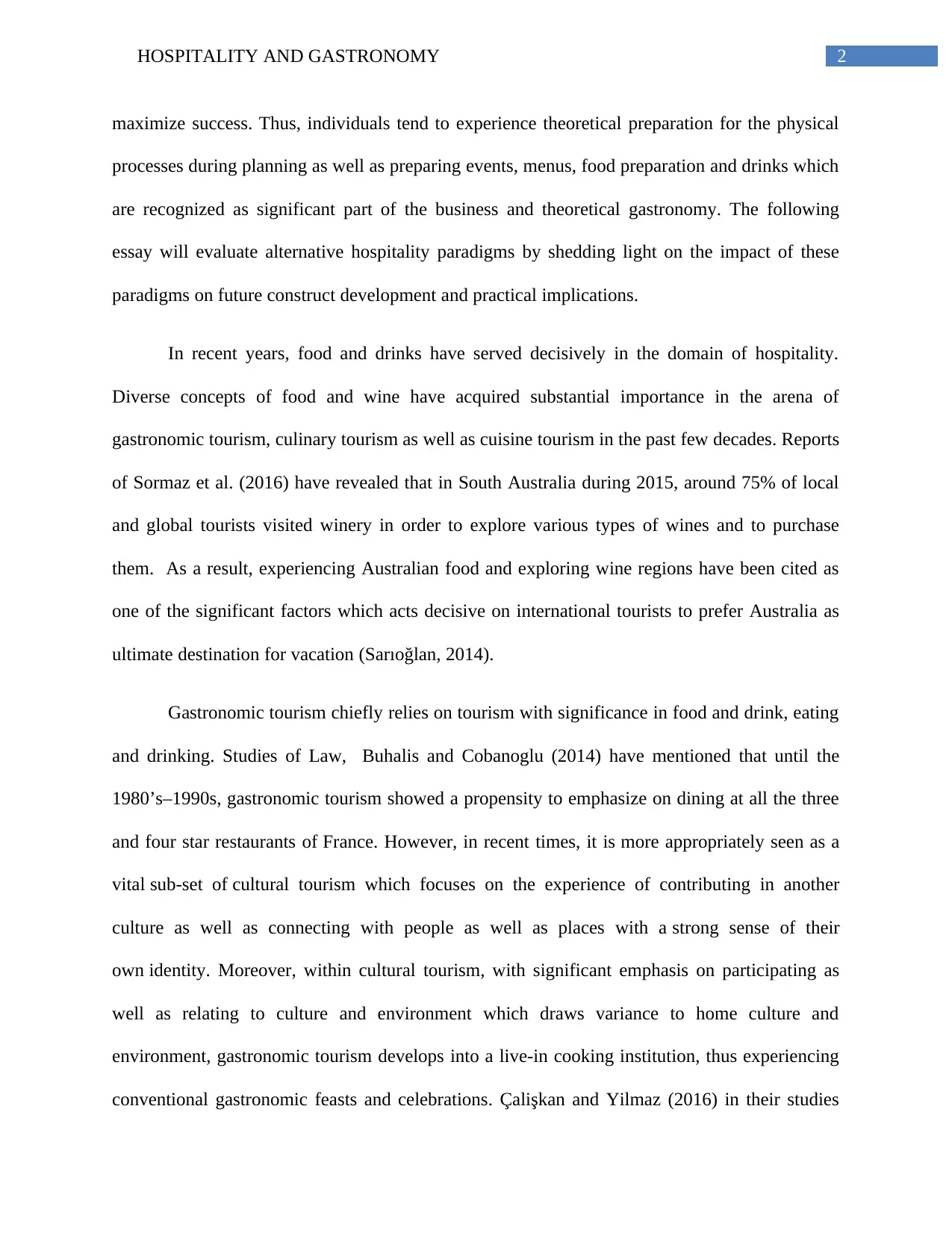
2HOSPITALITY AND GASTRONOMY
maximize success. Thus, individuals tend to experience theoretical preparation for the physical
processes during planning as well as preparing events, menus, food preparation and drinks which
are recognized as significant part of the business and theoretical gastronomy. The following
essay will evaluate alternative hospitality paradigms by shedding light on the impact of these
paradigms on future construct development and practical implications.
In recent years, food and drinks have served decisively in the domain of hospitality.
Diverse concepts of food and wine have acquired substantial importance in the arena of
gastronomic tourism, culinary tourism as well as cuisine tourism in the past few decades. Reports
of Sormaz et al. (2016) have revealed that in South Australia during 2015, around 75% of local
and global tourists visited winery in order to explore various types of wines and to purchase
them. As a result, experiencing Australian food and exploring wine regions have been cited as
one of the significant factors which acts decisive on international tourists to prefer Australia as
ultimate destination for vacation (Sarıoğlan, 2014).
Gastronomic tourism chiefly relies on tourism with significance in food and drink, eating
and drinking. Studies of Law, Buhalis and Cobanoglu (2014) have mentioned that until the
1980’s–1990s, gastronomic tourism showed a propensity to emphasize on dining at all the three
and four star restaurants of France. However, in recent times, it is more appropriately seen as a
vital sub-set of cultural tourism which focuses on the experience of contributing in another
culture as well as connecting with people as well as places with a strong sense of their
own identity. Moreover, within cultural tourism, with significant emphasis on participating as
well as relating to culture and environment which draws variance to home culture and
environment, gastronomic tourism develops into a live-in cooking institution, thus experiencing
conventional gastronomic feasts and celebrations. Çalişkan and Yilmaz (2016) in their studies
maximize success. Thus, individuals tend to experience theoretical preparation for the physical
processes during planning as well as preparing events, menus, food preparation and drinks which
are recognized as significant part of the business and theoretical gastronomy. The following
essay will evaluate alternative hospitality paradigms by shedding light on the impact of these
paradigms on future construct development and practical implications.
In recent years, food and drinks have served decisively in the domain of hospitality.
Diverse concepts of food and wine have acquired substantial importance in the arena of
gastronomic tourism, culinary tourism as well as cuisine tourism in the past few decades. Reports
of Sormaz et al. (2016) have revealed that in South Australia during 2015, around 75% of local
and global tourists visited winery in order to explore various types of wines and to purchase
them. As a result, experiencing Australian food and exploring wine regions have been cited as
one of the significant factors which acts decisive on international tourists to prefer Australia as
ultimate destination for vacation (Sarıoğlan, 2014).
Gastronomic tourism chiefly relies on tourism with significance in food and drink, eating
and drinking. Studies of Law, Buhalis and Cobanoglu (2014) have mentioned that until the
1980’s–1990s, gastronomic tourism showed a propensity to emphasize on dining at all the three
and four star restaurants of France. However, in recent times, it is more appropriately seen as a
vital sub-set of cultural tourism which focuses on the experience of contributing in another
culture as well as connecting with people as well as places with a strong sense of their
own identity. Moreover, within cultural tourism, with significant emphasis on participating as
well as relating to culture and environment which draws variance to home culture and
environment, gastronomic tourism develops into a live-in cooking institution, thus experiencing
conventional gastronomic feasts and celebrations. Çalişkan and Yilmaz (2016) in their studies
⊘ This is a preview!⊘
Do you want full access?
Subscribe today to unlock all pages.

Trusted by 1+ million students worldwide
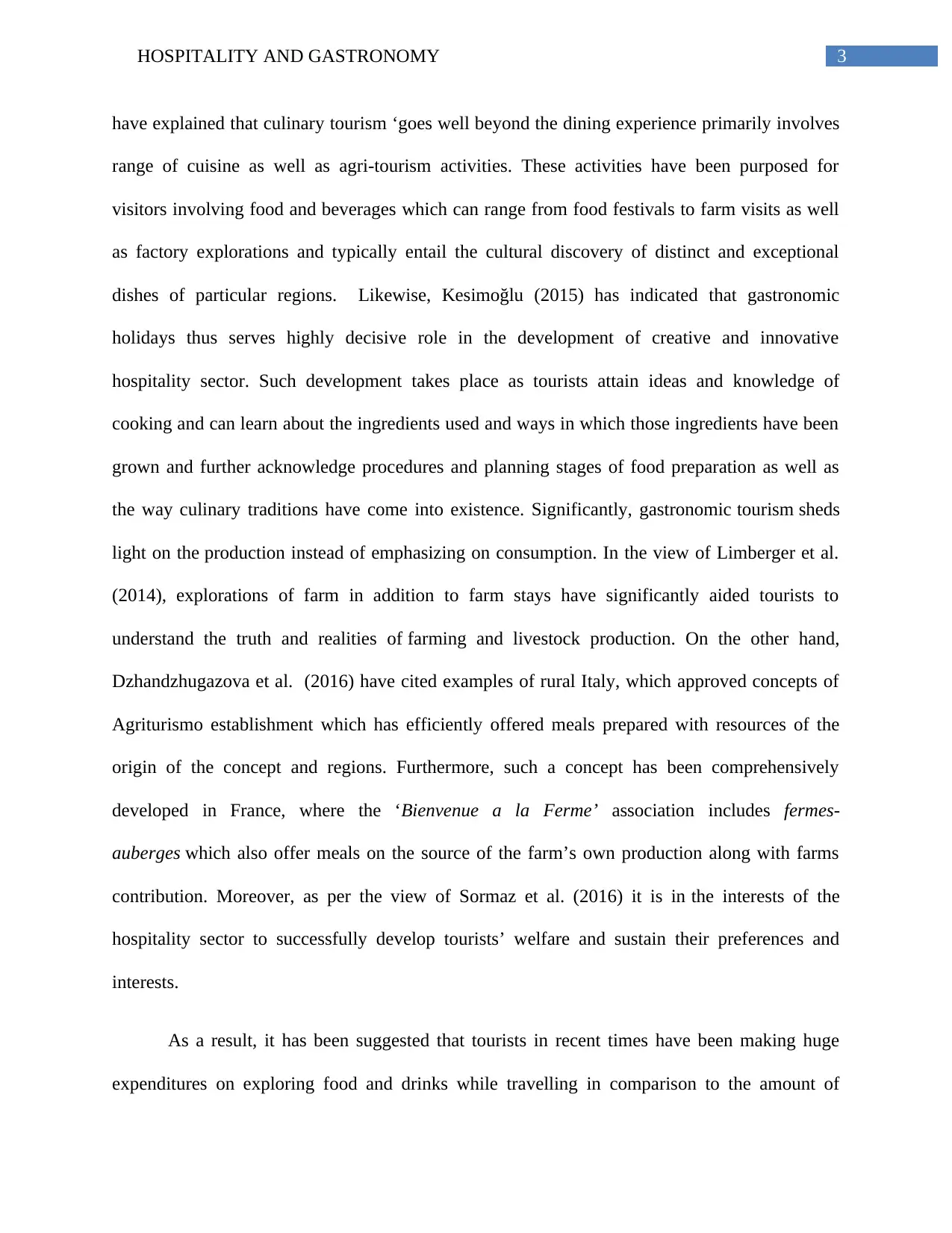
3HOSPITALITY AND GASTRONOMY
have explained that culinary tourism ‘goes well beyond the dining experience primarily involves
range of cuisine as well as agri-tourism activities. These activities have been purposed for
visitors involving food and beverages which can range from food festivals to farm visits as well
as factory explorations and typically entail the cultural discovery of distinct and exceptional
dishes of particular regions. Likewise, Kesimoğlu (2015) has indicated that gastronomic
holidays thus serves highly decisive role in the development of creative and innovative
hospitality sector. Such development takes place as tourists attain ideas and knowledge of
cooking and can learn about the ingredients used and ways in which those ingredients have been
grown and further acknowledge procedures and planning stages of food preparation as well as
the way culinary traditions have come into existence. Significantly, gastronomic tourism sheds
light on the production instead of emphasizing on consumption. In the view of Limberger et al.
(2014), explorations of farm in addition to farm stays have significantly aided tourists to
understand the truth and realities of farming and livestock production. On the other hand,
Dzhandzhugazova et al. (2016) have cited examples of rural Italy, which approved concepts of
Agriturismo establishment which has efficiently offered meals prepared with resources of the
origin of the concept and regions. Furthermore, such a concept has been comprehensively
developed in France, where the ‘Bienvenue a la Ferme’ association includes fermes-
auberges which also offer meals on the source of the farm’s own production along with farms
contribution. Moreover, as per the view of Sormaz et al. (2016) it is in the interests of the
hospitality sector to successfully develop tourists’ welfare and sustain their preferences and
interests.
As a result, it has been suggested that tourists in recent times have been making huge
expenditures on exploring food and drinks while travelling in comparison to the amount of
have explained that culinary tourism ‘goes well beyond the dining experience primarily involves
range of cuisine as well as agri-tourism activities. These activities have been purposed for
visitors involving food and beverages which can range from food festivals to farm visits as well
as factory explorations and typically entail the cultural discovery of distinct and exceptional
dishes of particular regions. Likewise, Kesimoğlu (2015) has indicated that gastronomic
holidays thus serves highly decisive role in the development of creative and innovative
hospitality sector. Such development takes place as tourists attain ideas and knowledge of
cooking and can learn about the ingredients used and ways in which those ingredients have been
grown and further acknowledge procedures and planning stages of food preparation as well as
the way culinary traditions have come into existence. Significantly, gastronomic tourism sheds
light on the production instead of emphasizing on consumption. In the view of Limberger et al.
(2014), explorations of farm in addition to farm stays have significantly aided tourists to
understand the truth and realities of farming and livestock production. On the other hand,
Dzhandzhugazova et al. (2016) have cited examples of rural Italy, which approved concepts of
Agriturismo establishment which has efficiently offered meals prepared with resources of the
origin of the concept and regions. Furthermore, such a concept has been comprehensively
developed in France, where the ‘Bienvenue a la Ferme’ association includes fermes-
auberges which also offer meals on the source of the farm’s own production along with farms
contribution. Moreover, as per the view of Sormaz et al. (2016) it is in the interests of the
hospitality sector to successfully develop tourists’ welfare and sustain their preferences and
interests.
As a result, it has been suggested that tourists in recent times have been making huge
expenditures on exploring food and drinks while travelling in comparison to the amount of
Paraphrase This Document
Need a fresh take? Get an instant paraphrase of this document with our AI Paraphraser
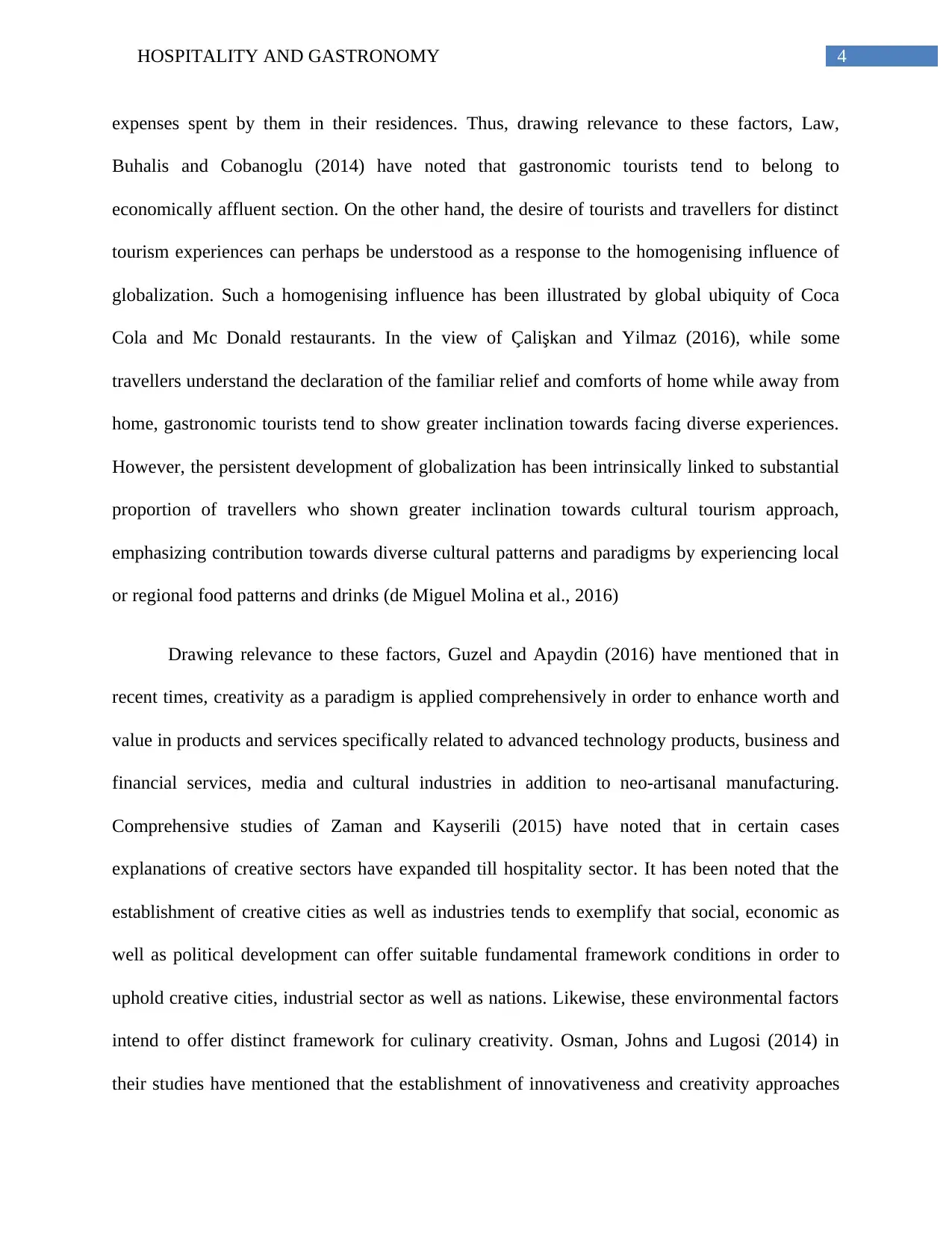
4HOSPITALITY AND GASTRONOMY
expenses spent by them in their residences. Thus, drawing relevance to these factors, Law,
Buhalis and Cobanoglu (2014) have noted that gastronomic tourists tend to belong to
economically affluent section. On the other hand, the desire of tourists and travellers for distinct
tourism experiences can perhaps be understood as a response to the homogenising influence of
globalization. Such a homogenising influence has been illustrated by global ubiquity of Coca
Cola and Mc Donald restaurants. In the view of Çalişkan and Yilmaz (2016), while some
travellers understand the declaration of the familiar relief and comforts of home while away from
home, gastronomic tourists tend to show greater inclination towards facing diverse experiences.
However, the persistent development of globalization has been intrinsically linked to substantial
proportion of travellers who shown greater inclination towards cultural tourism approach,
emphasizing contribution towards diverse cultural patterns and paradigms by experiencing local
or regional food patterns and drinks (de Miguel Molina et al., 2016)
Drawing relevance to these factors, Guzel and Apaydin (2016) have mentioned that in
recent times, creativity as a paradigm is applied comprehensively in order to enhance worth and
value in products and services specifically related to advanced technology products, business and
financial services, media and cultural industries in addition to neo-artisanal manufacturing.
Comprehensive studies of Zaman and Kayserili (2015) have noted that in certain cases
explanations of creative sectors have expanded till hospitality sector. It has been noted that the
establishment of creative cities as well as industries tends to exemplify that social, economic as
well as political development can offer suitable fundamental framework conditions in order to
uphold creative cities, industrial sector as well as nations. Likewise, these environmental factors
intend to offer distinct framework for culinary creativity. Osman, Johns and Lugosi (2014) in
their studies have mentioned that the establishment of innovativeness and creativity approaches
expenses spent by them in their residences. Thus, drawing relevance to these factors, Law,
Buhalis and Cobanoglu (2014) have noted that gastronomic tourists tend to belong to
economically affluent section. On the other hand, the desire of tourists and travellers for distinct
tourism experiences can perhaps be understood as a response to the homogenising influence of
globalization. Such a homogenising influence has been illustrated by global ubiquity of Coca
Cola and Mc Donald restaurants. In the view of Çalişkan and Yilmaz (2016), while some
travellers understand the declaration of the familiar relief and comforts of home while away from
home, gastronomic tourists tend to show greater inclination towards facing diverse experiences.
However, the persistent development of globalization has been intrinsically linked to substantial
proportion of travellers who shown greater inclination towards cultural tourism approach,
emphasizing contribution towards diverse cultural patterns and paradigms by experiencing local
or regional food patterns and drinks (de Miguel Molina et al., 2016)
Drawing relevance to these factors, Guzel and Apaydin (2016) have mentioned that in
recent times, creativity as a paradigm is applied comprehensively in order to enhance worth and
value in products and services specifically related to advanced technology products, business and
financial services, media and cultural industries in addition to neo-artisanal manufacturing.
Comprehensive studies of Zaman and Kayserili (2015) have noted that in certain cases
explanations of creative sectors have expanded till hospitality sector. It has been noted that the
establishment of creative cities as well as industries tends to exemplify that social, economic as
well as political development can offer suitable fundamental framework conditions in order to
uphold creative cities, industrial sector as well as nations. Likewise, these environmental factors
intend to offer distinct framework for culinary creativity. Osman, Johns and Lugosi (2014) in
their studies have mentioned that the establishment of innovativeness and creativity approaches
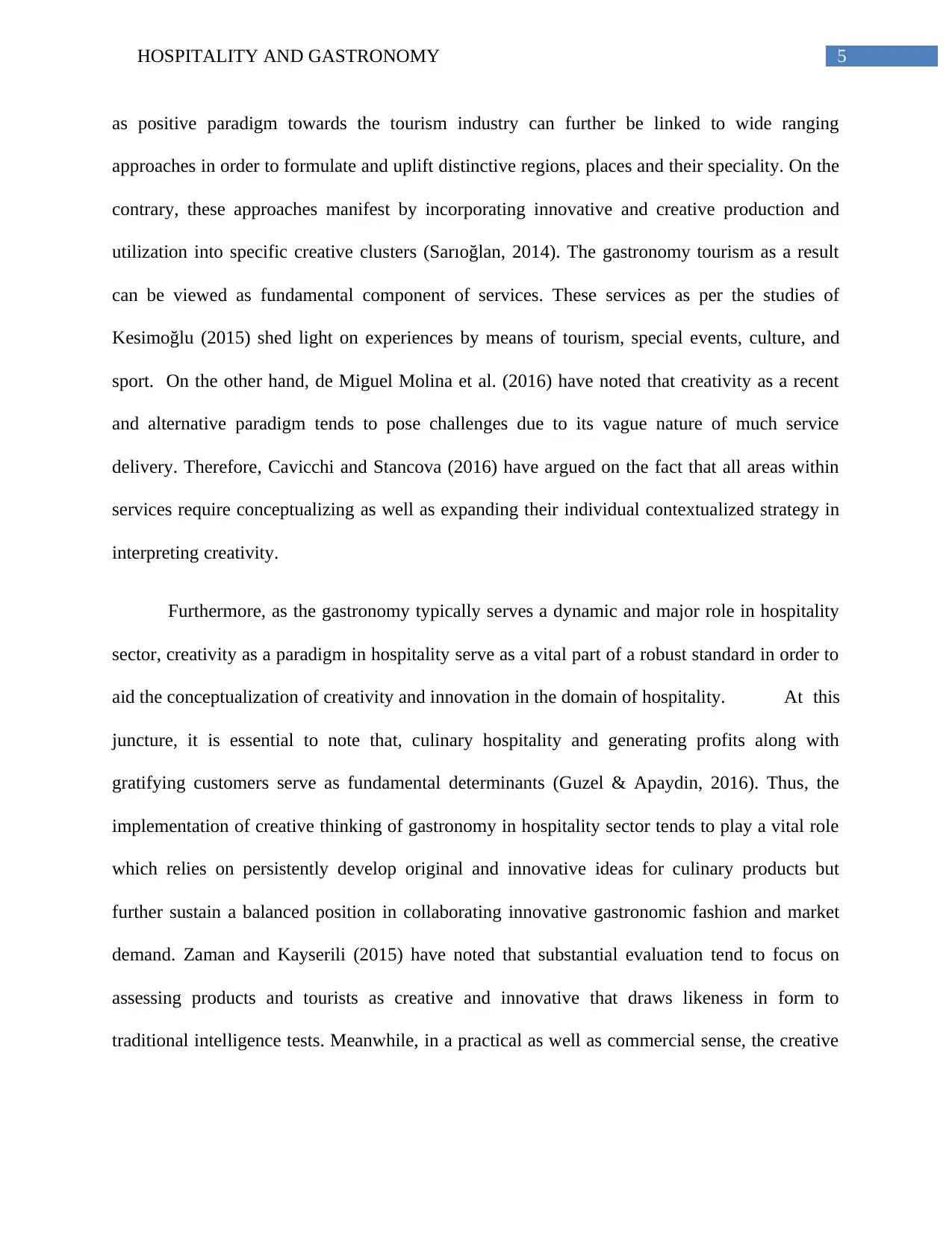
5HOSPITALITY AND GASTRONOMY
as positive paradigm towards the tourism industry can further be linked to wide ranging
approaches in order to formulate and uplift distinctive regions, places and their speciality. On the
contrary, these approaches manifest by incorporating innovative and creative production and
utilization into specific creative clusters (Sarıoğlan, 2014). The gastronomy tourism as a result
can be viewed as fundamental component of services. These services as per the studies of
Kesimoğlu (2015) shed light on experiences by means of tourism, special events, culture, and
sport. On the other hand, de Miguel Molina et al. (2016) have noted that creativity as a recent
and alternative paradigm tends to pose challenges due to its vague nature of much service
delivery. Therefore, Cavicchi and Stancova (2016) have argued on the fact that all areas within
services require conceptualizing as well as expanding their individual contextualized strategy in
interpreting creativity.
Furthermore, as the gastronomy typically serves a dynamic and major role in hospitality
sector, creativity as a paradigm in hospitality serve as a vital part of a robust standard in order to
aid the conceptualization of creativity and innovation in the domain of hospitality. At this
juncture, it is essential to note that, culinary hospitality and generating profits along with
gratifying customers serve as fundamental determinants (Guzel & Apaydin, 2016). Thus, the
implementation of creative thinking of gastronomy in hospitality sector tends to play a vital role
which relies on persistently develop original and innovative ideas for culinary products but
further sustain a balanced position in collaborating innovative gastronomic fashion and market
demand. Zaman and Kayserili (2015) have noted that substantial evaluation tend to focus on
assessing products and tourists as creative and innovative that draws likeness in form to
traditional intelligence tests. Meanwhile, in a practical as well as commercial sense, the creative
as positive paradigm towards the tourism industry can further be linked to wide ranging
approaches in order to formulate and uplift distinctive regions, places and their speciality. On the
contrary, these approaches manifest by incorporating innovative and creative production and
utilization into specific creative clusters (Sarıoğlan, 2014). The gastronomy tourism as a result
can be viewed as fundamental component of services. These services as per the studies of
Kesimoğlu (2015) shed light on experiences by means of tourism, special events, culture, and
sport. On the other hand, de Miguel Molina et al. (2016) have noted that creativity as a recent
and alternative paradigm tends to pose challenges due to its vague nature of much service
delivery. Therefore, Cavicchi and Stancova (2016) have argued on the fact that all areas within
services require conceptualizing as well as expanding their individual contextualized strategy in
interpreting creativity.
Furthermore, as the gastronomy typically serves a dynamic and major role in hospitality
sector, creativity as a paradigm in hospitality serve as a vital part of a robust standard in order to
aid the conceptualization of creativity and innovation in the domain of hospitality. At this
juncture, it is essential to note that, culinary hospitality and generating profits along with
gratifying customers serve as fundamental determinants (Guzel & Apaydin, 2016). Thus, the
implementation of creative thinking of gastronomy in hospitality sector tends to play a vital role
which relies on persistently develop original and innovative ideas for culinary products but
further sustain a balanced position in collaborating innovative gastronomic fashion and market
demand. Zaman and Kayserili (2015) have noted that substantial evaluation tend to focus on
assessing products and tourists as creative and innovative that draws likeness in form to
traditional intelligence tests. Meanwhile, in a practical as well as commercial sense, the creative
⊘ This is a preview!⊘
Do you want full access?
Subscribe today to unlock all pages.

Trusted by 1+ million students worldwide
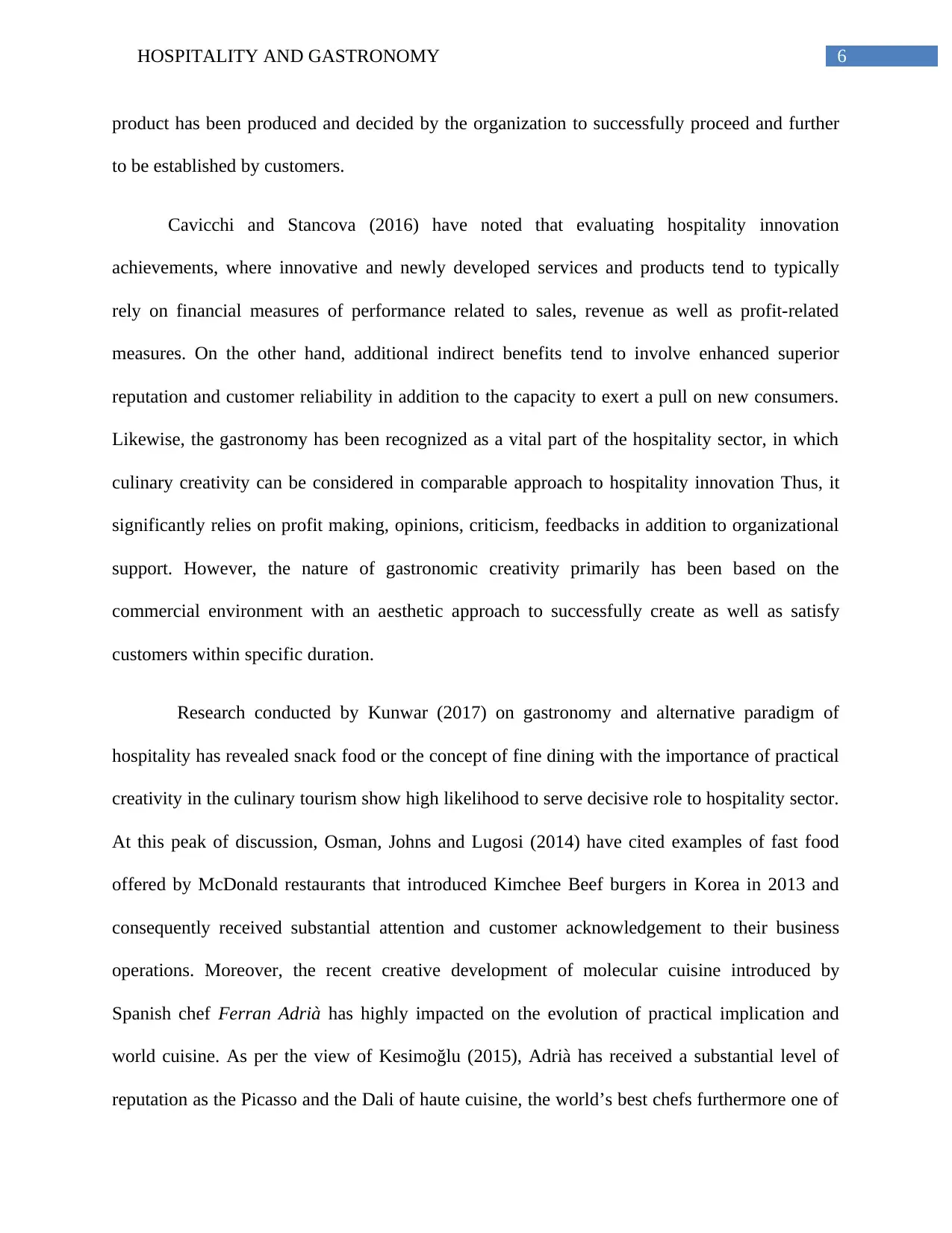
6HOSPITALITY AND GASTRONOMY
product has been produced and decided by the organization to successfully proceed and further
to be established by customers.
Cavicchi and Stancova (2016) have noted that evaluating hospitality innovation
achievements, where innovative and newly developed services and products tend to typically
rely on financial measures of performance related to sales, revenue as well as profit-related
measures. On the other hand, additional indirect benefits tend to involve enhanced superior
reputation and customer reliability in addition to the capacity to exert a pull on new consumers.
Likewise, the gastronomy has been recognized as a vital part of the hospitality sector, in which
culinary creativity can be considered in comparable approach to hospitality innovation Thus, it
significantly relies on profit making, opinions, criticism, feedbacks in addition to organizational
support. However, the nature of gastronomic creativity primarily has been based on the
commercial environment with an aesthetic approach to successfully create as well as satisfy
customers within specific duration.
Research conducted by Kunwar (2017) on gastronomy and alternative paradigm of
hospitality has revealed snack food or the concept of fine dining with the importance of practical
creativity in the culinary tourism show high likelihood to serve decisive role to hospitality sector.
At this peak of discussion, Osman, Johns and Lugosi (2014) have cited examples of fast food
offered by McDonald restaurants that introduced Kimchee Beef burgers in Korea in 2013 and
consequently received substantial attention and customer acknowledgement to their business
operations. Moreover, the recent creative development of molecular cuisine introduced by
Spanish chef Ferran Adrià has highly impacted on the evolution of practical implication and
world cuisine. As per the view of Kesimoğlu (2015), Adrià has received a substantial level of
reputation as the Picasso and the Dali of haute cuisine, the world’s best chefs furthermore one of
product has been produced and decided by the organization to successfully proceed and further
to be established by customers.
Cavicchi and Stancova (2016) have noted that evaluating hospitality innovation
achievements, where innovative and newly developed services and products tend to typically
rely on financial measures of performance related to sales, revenue as well as profit-related
measures. On the other hand, additional indirect benefits tend to involve enhanced superior
reputation and customer reliability in addition to the capacity to exert a pull on new consumers.
Likewise, the gastronomy has been recognized as a vital part of the hospitality sector, in which
culinary creativity can be considered in comparable approach to hospitality innovation Thus, it
significantly relies on profit making, opinions, criticism, feedbacks in addition to organizational
support. However, the nature of gastronomic creativity primarily has been based on the
commercial environment with an aesthetic approach to successfully create as well as satisfy
customers within specific duration.
Research conducted by Kunwar (2017) on gastronomy and alternative paradigm of
hospitality has revealed snack food or the concept of fine dining with the importance of practical
creativity in the culinary tourism show high likelihood to serve decisive role to hospitality sector.
At this peak of discussion, Osman, Johns and Lugosi (2014) have cited examples of fast food
offered by McDonald restaurants that introduced Kimchee Beef burgers in Korea in 2013 and
consequently received substantial attention and customer acknowledgement to their business
operations. Moreover, the recent creative development of molecular cuisine introduced by
Spanish chef Ferran Adrià has highly impacted on the evolution of practical implication and
world cuisine. As per the view of Kesimoğlu (2015), Adrià has received a substantial level of
reputation as the Picasso and the Dali of haute cuisine, the world’s best chefs furthermore one of
Paraphrase This Document
Need a fresh take? Get an instant paraphrase of this document with our AI Paraphraser
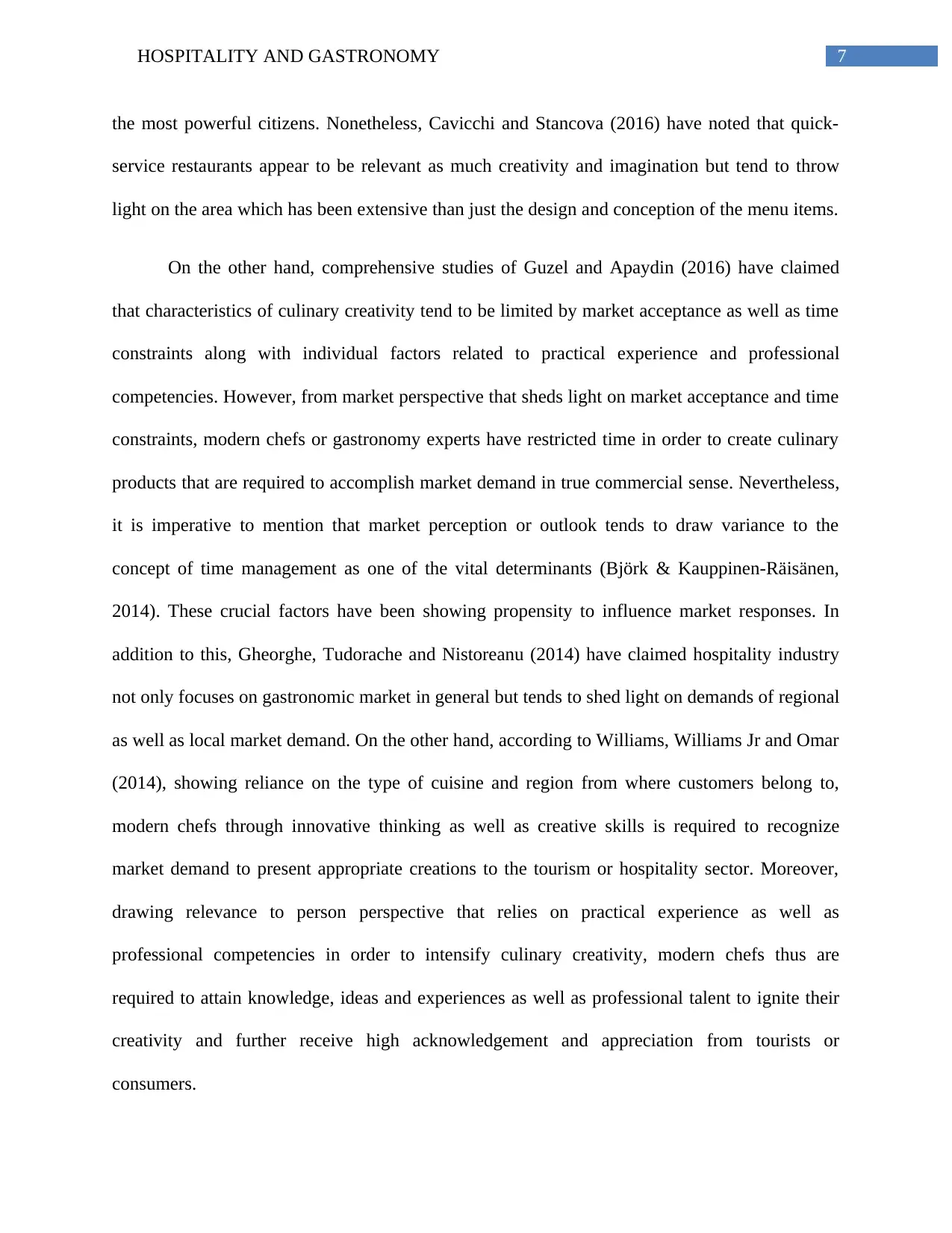
7HOSPITALITY AND GASTRONOMY
the most powerful citizens. Nonetheless, Cavicchi and Stancova (2016) have noted that quick-
service restaurants appear to be relevant as much creativity and imagination but tend to throw
light on the area which has been extensive than just the design and conception of the menu items.
On the other hand, comprehensive studies of Guzel and Apaydin (2016) have claimed
that characteristics of culinary creativity tend to be limited by market acceptance as well as time
constraints along with individual factors related to practical experience and professional
competencies. However, from market perspective that sheds light on market acceptance and time
constraints, modern chefs or gastronomy experts have restricted time in order to create culinary
products that are required to accomplish market demand in true commercial sense. Nevertheless,
it is imperative to mention that market perception or outlook tends to draw variance to the
concept of time management as one of the vital determinants (Björk & Kauppinen-Räisänen,
2014). These crucial factors have been showing propensity to influence market responses. In
addition to this, Gheorghe, Tudorache and Nistoreanu (2014) have claimed hospitality industry
not only focuses on gastronomic market in general but tends to shed light on demands of regional
as well as local market demand. On the other hand, according to Williams, Williams Jr and Omar
(2014), showing reliance on the type of cuisine and region from where customers belong to,
modern chefs through innovative thinking as well as creative skills is required to recognize
market demand to present appropriate creations to the tourism or hospitality sector. Moreover,
drawing relevance to person perspective that relies on practical experience as well as
professional competencies in order to intensify culinary creativity, modern chefs thus are
required to attain knowledge, ideas and experiences as well as professional talent to ignite their
creativity and further receive high acknowledgement and appreciation from tourists or
consumers.
the most powerful citizens. Nonetheless, Cavicchi and Stancova (2016) have noted that quick-
service restaurants appear to be relevant as much creativity and imagination but tend to throw
light on the area which has been extensive than just the design and conception of the menu items.
On the other hand, comprehensive studies of Guzel and Apaydin (2016) have claimed
that characteristics of culinary creativity tend to be limited by market acceptance as well as time
constraints along with individual factors related to practical experience and professional
competencies. However, from market perspective that sheds light on market acceptance and time
constraints, modern chefs or gastronomy experts have restricted time in order to create culinary
products that are required to accomplish market demand in true commercial sense. Nevertheless,
it is imperative to mention that market perception or outlook tends to draw variance to the
concept of time management as one of the vital determinants (Björk & Kauppinen-Räisänen,
2014). These crucial factors have been showing propensity to influence market responses. In
addition to this, Gheorghe, Tudorache and Nistoreanu (2014) have claimed hospitality industry
not only focuses on gastronomic market in general but tends to shed light on demands of regional
as well as local market demand. On the other hand, according to Williams, Williams Jr and Omar
(2014), showing reliance on the type of cuisine and region from where customers belong to,
modern chefs through innovative thinking as well as creative skills is required to recognize
market demand to present appropriate creations to the tourism or hospitality sector. Moreover,
drawing relevance to person perspective that relies on practical experience as well as
professional competencies in order to intensify culinary creativity, modern chefs thus are
required to attain knowledge, ideas and experiences as well as professional talent to ignite their
creativity and further receive high acknowledgement and appreciation from tourists or
consumers.
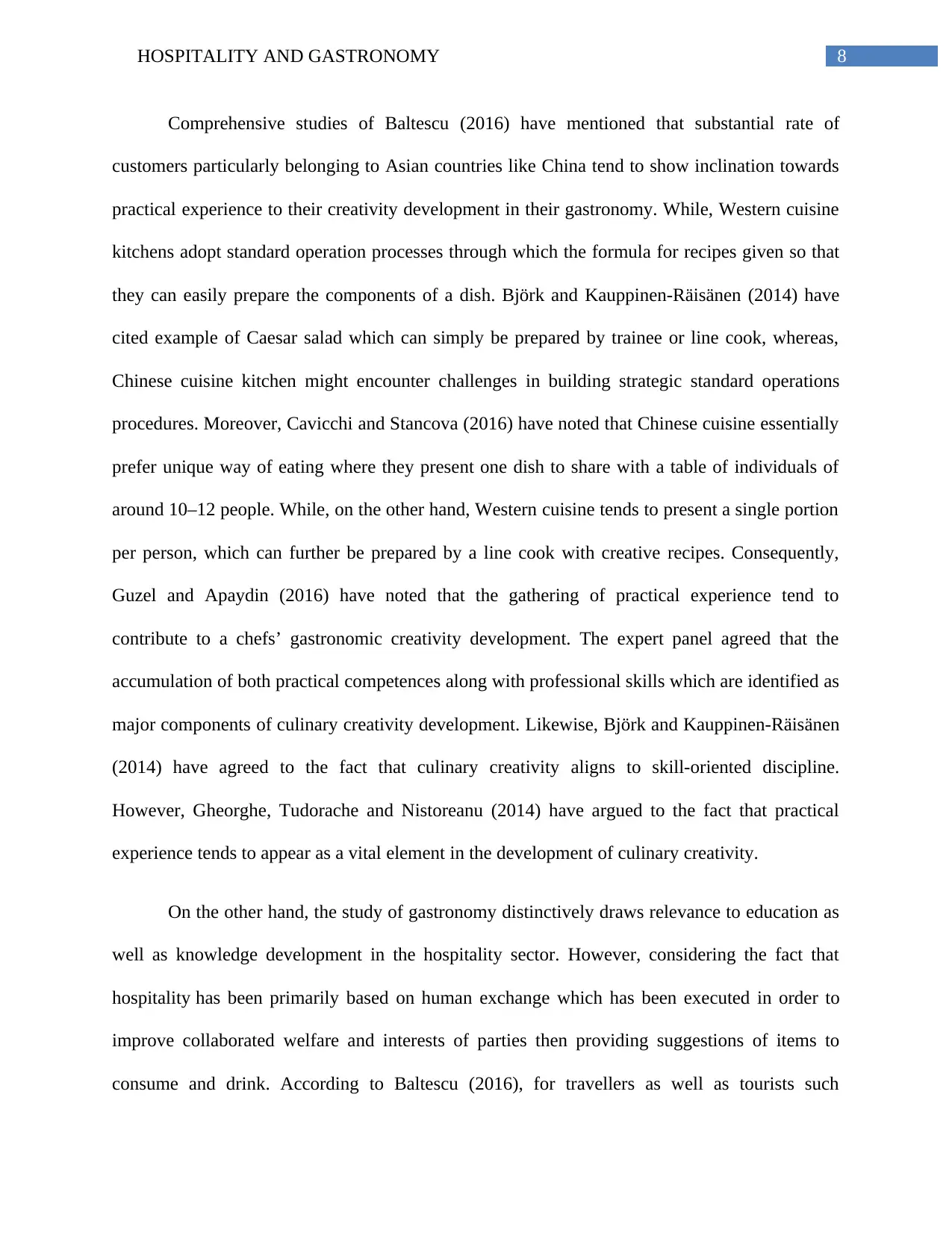
8HOSPITALITY AND GASTRONOMY
Comprehensive studies of Baltescu (2016) have mentioned that substantial rate of
customers particularly belonging to Asian countries like China tend to show inclination towards
practical experience to their creativity development in their gastronomy. While, Western cuisine
kitchens adopt standard operation processes through which the formula for recipes given so that
they can easily prepare the components of a dish. Björk and Kauppinen-Räisänen (2014) have
cited example of Caesar salad which can simply be prepared by trainee or line cook, whereas,
Chinese cuisine kitchen might encounter challenges in building strategic standard operations
procedures. Moreover, Cavicchi and Stancova (2016) have noted that Chinese cuisine essentially
prefer unique way of eating where they present one dish to share with a table of individuals of
around 10–12 people. While, on the other hand, Western cuisine tends to present a single portion
per person, which can further be prepared by a line cook with creative recipes. Consequently,
Guzel and Apaydin (2016) have noted that the gathering of practical experience tend to
contribute to a chefs’ gastronomic creativity development. The expert panel agreed that the
accumulation of both practical competences along with professional skills which are identified as
major components of culinary creativity development. Likewise, Björk and Kauppinen-Räisänen
(2014) have agreed to the fact that culinary creativity aligns to skill-oriented discipline.
However, Gheorghe, Tudorache and Nistoreanu (2014) have argued to the fact that practical
experience tends to appear as a vital element in the development of culinary creativity.
On the other hand, the study of gastronomy distinctively draws relevance to education as
well as knowledge development in the hospitality sector. However, considering the fact that
hospitality has been primarily based on human exchange which has been executed in order to
improve collaborated welfare and interests of parties then providing suggestions of items to
consume and drink. According to Baltescu (2016), for travellers as well as tourists such
Comprehensive studies of Baltescu (2016) have mentioned that substantial rate of
customers particularly belonging to Asian countries like China tend to show inclination towards
practical experience to their creativity development in their gastronomy. While, Western cuisine
kitchens adopt standard operation processes through which the formula for recipes given so that
they can easily prepare the components of a dish. Björk and Kauppinen-Räisänen (2014) have
cited example of Caesar salad which can simply be prepared by trainee or line cook, whereas,
Chinese cuisine kitchen might encounter challenges in building strategic standard operations
procedures. Moreover, Cavicchi and Stancova (2016) have noted that Chinese cuisine essentially
prefer unique way of eating where they present one dish to share with a table of individuals of
around 10–12 people. While, on the other hand, Western cuisine tends to present a single portion
per person, which can further be prepared by a line cook with creative recipes. Consequently,
Guzel and Apaydin (2016) have noted that the gathering of practical experience tend to
contribute to a chefs’ gastronomic creativity development. The expert panel agreed that the
accumulation of both practical competences along with professional skills which are identified as
major components of culinary creativity development. Likewise, Björk and Kauppinen-Räisänen
(2014) have agreed to the fact that culinary creativity aligns to skill-oriented discipline.
However, Gheorghe, Tudorache and Nistoreanu (2014) have argued to the fact that practical
experience tends to appear as a vital element in the development of culinary creativity.
On the other hand, the study of gastronomy distinctively draws relevance to education as
well as knowledge development in the hospitality sector. However, considering the fact that
hospitality has been primarily based on human exchange which has been executed in order to
improve collaborated welfare and interests of parties then providing suggestions of items to
consume and drink. According to Baltescu (2016), for travellers as well as tourists such
⊘ This is a preview!⊘
Do you want full access?
Subscribe today to unlock all pages.

Trusted by 1+ million students worldwide
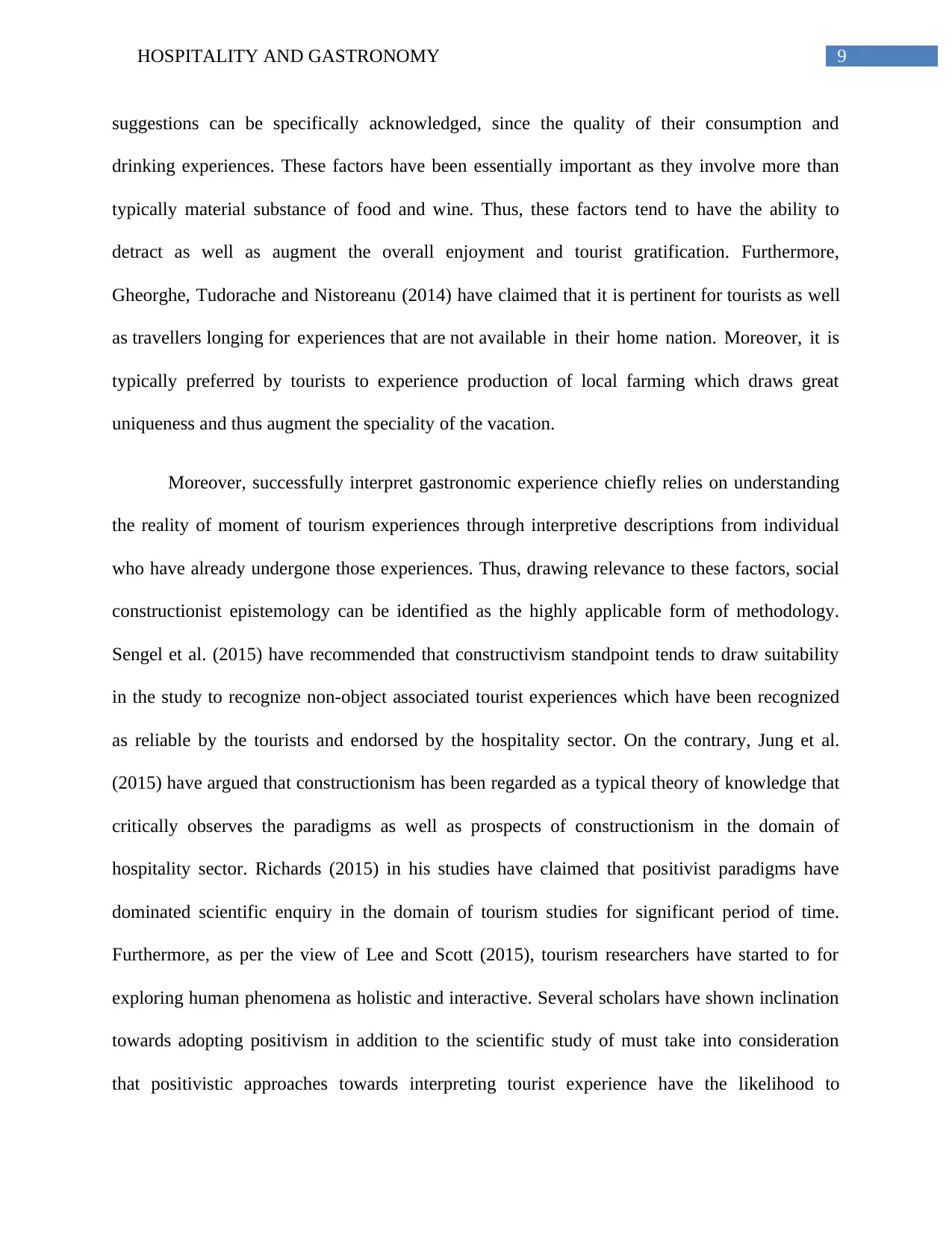
9HOSPITALITY AND GASTRONOMY
suggestions can be specifically acknowledged, since the quality of their consumption and
drinking experiences. These factors have been essentially important as they involve more than
typically material substance of food and wine. Thus, these factors tend to have the ability to
detract as well as augment the overall enjoyment and tourist gratification. Furthermore,
Gheorghe, Tudorache and Nistoreanu (2014) have claimed that it is pertinent for tourists as well
as travellers longing for experiences that are not available in their home nation. Moreover, it is
typically preferred by tourists to experience production of local farming which draws great
uniqueness and thus augment the speciality of the vacation.
Moreover, successfully interpret gastronomic experience chiefly relies on understanding
the reality of moment of tourism experiences through interpretive descriptions from individual
who have already undergone those experiences. Thus, drawing relevance to these factors, social
constructionist epistemology can be identified as the highly applicable form of methodology.
Sengel et al. (2015) have recommended that constructivism standpoint tends to draw suitability
in the study to recognize non-object associated tourist experiences which have been recognized
as reliable by the tourists and endorsed by the hospitality sector. On the contrary, Jung et al.
(2015) have argued that constructionism has been regarded as a typical theory of knowledge that
critically observes the paradigms as well as prospects of constructionism in the domain of
hospitality sector. Richards (2015) in his studies have claimed that positivist paradigms have
dominated scientific enquiry in the domain of tourism studies for significant period of time.
Furthermore, as per the view of Lee and Scott (2015), tourism researchers have started to for
exploring human phenomena as holistic and interactive. Several scholars have shown inclination
towards adopting positivism in addition to the scientific study of must take into consideration
that positivistic approaches towards interpreting tourist experience have the likelihood to
suggestions can be specifically acknowledged, since the quality of their consumption and
drinking experiences. These factors have been essentially important as they involve more than
typically material substance of food and wine. Thus, these factors tend to have the ability to
detract as well as augment the overall enjoyment and tourist gratification. Furthermore,
Gheorghe, Tudorache and Nistoreanu (2014) have claimed that it is pertinent for tourists as well
as travellers longing for experiences that are not available in their home nation. Moreover, it is
typically preferred by tourists to experience production of local farming which draws great
uniqueness and thus augment the speciality of the vacation.
Moreover, successfully interpret gastronomic experience chiefly relies on understanding
the reality of moment of tourism experiences through interpretive descriptions from individual
who have already undergone those experiences. Thus, drawing relevance to these factors, social
constructionist epistemology can be identified as the highly applicable form of methodology.
Sengel et al. (2015) have recommended that constructivism standpoint tends to draw suitability
in the study to recognize non-object associated tourist experiences which have been recognized
as reliable by the tourists and endorsed by the hospitality sector. On the contrary, Jung et al.
(2015) have argued that constructionism has been regarded as a typical theory of knowledge that
critically observes the paradigms as well as prospects of constructionism in the domain of
hospitality sector. Richards (2015) in his studies have claimed that positivist paradigms have
dominated scientific enquiry in the domain of tourism studies for significant period of time.
Furthermore, as per the view of Lee and Scott (2015), tourism researchers have started to for
exploring human phenomena as holistic and interactive. Several scholars have shown inclination
towards adopting positivism in addition to the scientific study of must take into consideration
that positivistic approaches towards interpreting tourist experience have the likelihood to
Paraphrase This Document
Need a fresh take? Get an instant paraphrase of this document with our AI Paraphraser
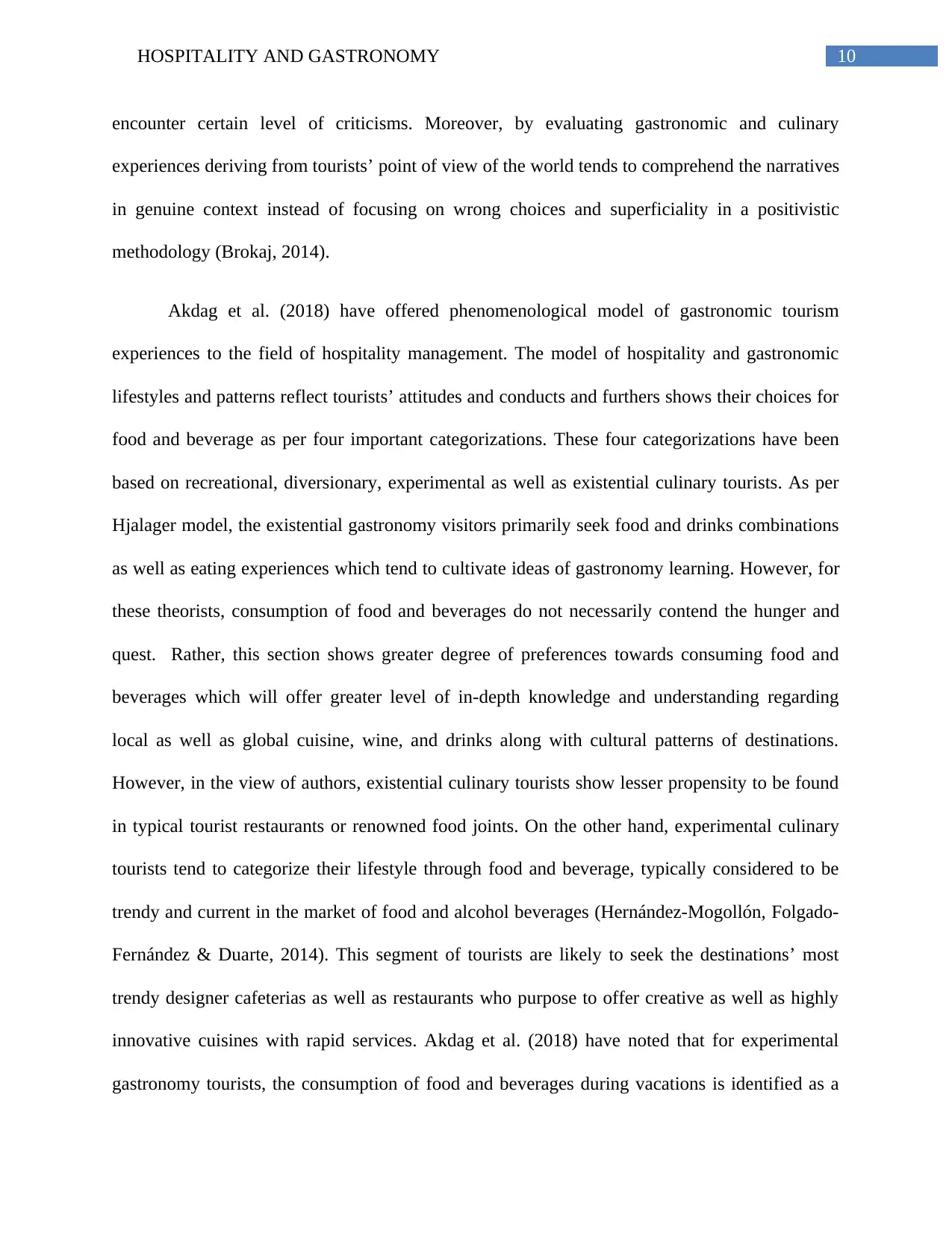
10HOSPITALITY AND GASTRONOMY
encounter certain level of criticisms. Moreover, by evaluating gastronomic and culinary
experiences deriving from tourists’ point of view of the world tends to comprehend the narratives
in genuine context instead of focusing on wrong choices and superficiality in a positivistic
methodology (Brokaj, 2014).
Akdag et al. (2018) have offered phenomenological model of gastronomic tourism
experiences to the field of hospitality management. The model of hospitality and gastronomic
lifestyles and patterns reflect tourists’ attitudes and conducts and furthers shows their choices for
food and beverage as per four important categorizations. These four categorizations have been
based on recreational, diversionary, experimental as well as existential culinary tourists. As per
Hjalager model, the existential gastronomy visitors primarily seek food and drinks combinations
as well as eating experiences which tend to cultivate ideas of gastronomy learning. However, for
these theorists, consumption of food and beverages do not necessarily contend the hunger and
quest. Rather, this section shows greater degree of preferences towards consuming food and
beverages which will offer greater level of in-depth knowledge and understanding regarding
local as well as global cuisine, wine, and drinks along with cultural patterns of destinations.
However, in the view of authors, existential culinary tourists show lesser propensity to be found
in typical tourist restaurants or renowned food joints. On the other hand, experimental culinary
tourists tend to categorize their lifestyle through food and beverage, typically considered to be
trendy and current in the market of food and alcohol beverages (Hernández-Mogollón, Folgado-
Fernández & Duarte, 2014). This segment of tourists are likely to seek the destinations’ most
trendy designer cafeterias as well as restaurants who purpose to offer creative as well as highly
innovative cuisines with rapid services. Akdag et al. (2018) have noted that for experimental
gastronomy tourists, the consumption of food and beverages during vacations is identified as a
encounter certain level of criticisms. Moreover, by evaluating gastronomic and culinary
experiences deriving from tourists’ point of view of the world tends to comprehend the narratives
in genuine context instead of focusing on wrong choices and superficiality in a positivistic
methodology (Brokaj, 2014).
Akdag et al. (2018) have offered phenomenological model of gastronomic tourism
experiences to the field of hospitality management. The model of hospitality and gastronomic
lifestyles and patterns reflect tourists’ attitudes and conducts and furthers shows their choices for
food and beverage as per four important categorizations. These four categorizations have been
based on recreational, diversionary, experimental as well as existential culinary tourists. As per
Hjalager model, the existential gastronomy visitors primarily seek food and drinks combinations
as well as eating experiences which tend to cultivate ideas of gastronomy learning. However, for
these theorists, consumption of food and beverages do not necessarily contend the hunger and
quest. Rather, this section shows greater degree of preferences towards consuming food and
beverages which will offer greater level of in-depth knowledge and understanding regarding
local as well as global cuisine, wine, and drinks along with cultural patterns of destinations.
However, in the view of authors, existential culinary tourists show lesser propensity to be found
in typical tourist restaurants or renowned food joints. On the other hand, experimental culinary
tourists tend to categorize their lifestyle through food and beverage, typically considered to be
trendy and current in the market of food and alcohol beverages (Hernández-Mogollón, Folgado-
Fernández & Duarte, 2014). This segment of tourists are likely to seek the destinations’ most
trendy designer cafeterias as well as restaurants who purpose to offer creative as well as highly
innovative cuisines with rapid services. Akdag et al. (2018) have noted that for experimental
gastronomy tourists, the consumption of food and beverages during vacations is identified as a
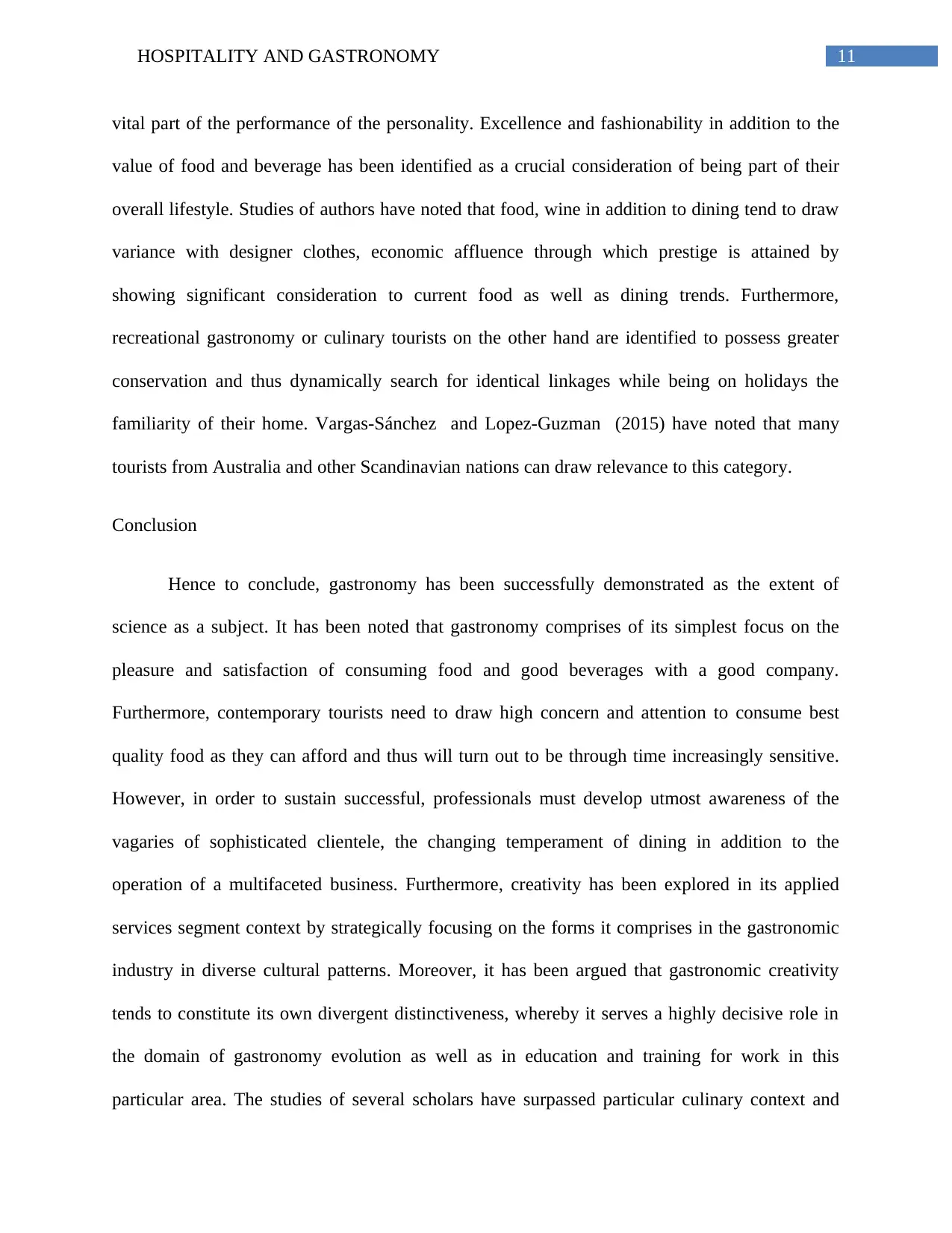
11HOSPITALITY AND GASTRONOMY
vital part of the performance of the personality. Excellence and fashionability in addition to the
value of food and beverage has been identified as a crucial consideration of being part of their
overall lifestyle. Studies of authors have noted that food, wine in addition to dining tend to draw
variance with designer clothes, economic affluence through which prestige is attained by
showing significant consideration to current food as well as dining trends. Furthermore,
recreational gastronomy or culinary tourists on the other hand are identified to possess greater
conservation and thus dynamically search for identical linkages while being on holidays the
familiarity of their home. Vargas-Sánchez and Lopez-Guzman (2015) have noted that many
tourists from Australia and other Scandinavian nations can draw relevance to this category.
Conclusion
Hence to conclude, gastronomy has been successfully demonstrated as the extent of
science as a subject. It has been noted that gastronomy comprises of its simplest focus on the
pleasure and satisfaction of consuming food and good beverages with a good company.
Furthermore, contemporary tourists need to draw high concern and attention to consume best
quality food as they can afford and thus will turn out to be through time increasingly sensitive.
However, in order to sustain successful, professionals must develop utmost awareness of the
vagaries of sophisticated clientele, the changing temperament of dining in addition to the
operation of a multifaceted business. Furthermore, creativity has been explored in its applied
services segment context by strategically focusing on the forms it comprises in the gastronomic
industry in diverse cultural patterns. Moreover, it has been argued that gastronomic creativity
tends to constitute its own divergent distinctiveness, whereby it serves a highly decisive role in
the domain of gastronomy evolution as well as in education and training for work in this
particular area. The studies of several scholars have surpassed particular culinary context and
vital part of the performance of the personality. Excellence and fashionability in addition to the
value of food and beverage has been identified as a crucial consideration of being part of their
overall lifestyle. Studies of authors have noted that food, wine in addition to dining tend to draw
variance with designer clothes, economic affluence through which prestige is attained by
showing significant consideration to current food as well as dining trends. Furthermore,
recreational gastronomy or culinary tourists on the other hand are identified to possess greater
conservation and thus dynamically search for identical linkages while being on holidays the
familiarity of their home. Vargas-Sánchez and Lopez-Guzman (2015) have noted that many
tourists from Australia and other Scandinavian nations can draw relevance to this category.
Conclusion
Hence to conclude, gastronomy has been successfully demonstrated as the extent of
science as a subject. It has been noted that gastronomy comprises of its simplest focus on the
pleasure and satisfaction of consuming food and good beverages with a good company.
Furthermore, contemporary tourists need to draw high concern and attention to consume best
quality food as they can afford and thus will turn out to be through time increasingly sensitive.
However, in order to sustain successful, professionals must develop utmost awareness of the
vagaries of sophisticated clientele, the changing temperament of dining in addition to the
operation of a multifaceted business. Furthermore, creativity has been explored in its applied
services segment context by strategically focusing on the forms it comprises in the gastronomic
industry in diverse cultural patterns. Moreover, it has been argued that gastronomic creativity
tends to constitute its own divergent distinctiveness, whereby it serves a highly decisive role in
the domain of gastronomy evolution as well as in education and training for work in this
particular area. The studies of several scholars have surpassed particular culinary context and
⊘ This is a preview!⊘
Do you want full access?
Subscribe today to unlock all pages.

Trusted by 1+ million students worldwide
1 out of 17
Related Documents
Your All-in-One AI-Powered Toolkit for Academic Success.
+13062052269
info@desklib.com
Available 24*7 on WhatsApp / Email
![[object Object]](/_next/static/media/star-bottom.7253800d.svg)
Unlock your academic potential
Copyright © 2020–2026 A2Z Services. All Rights Reserved. Developed and managed by ZUCOL.




